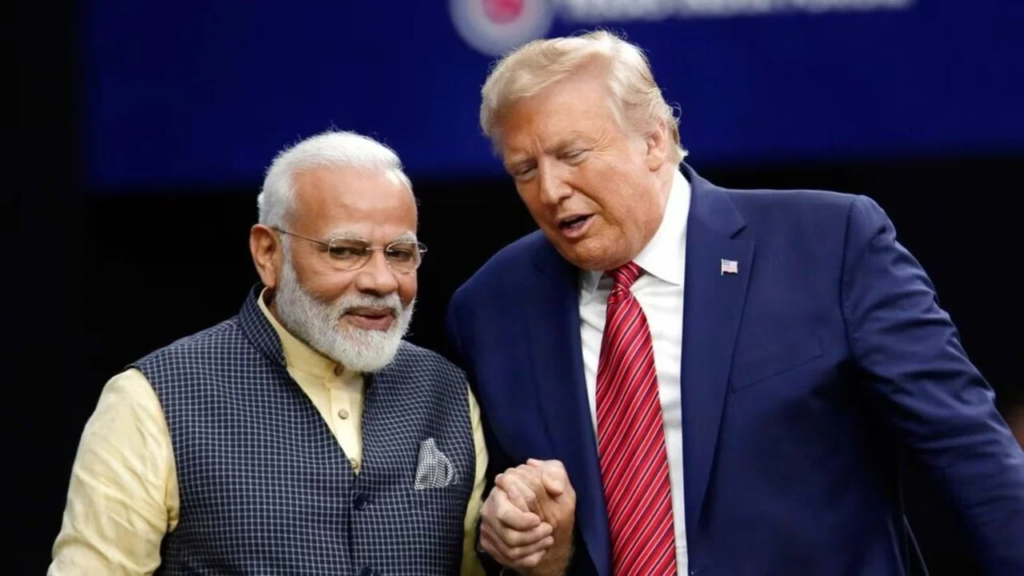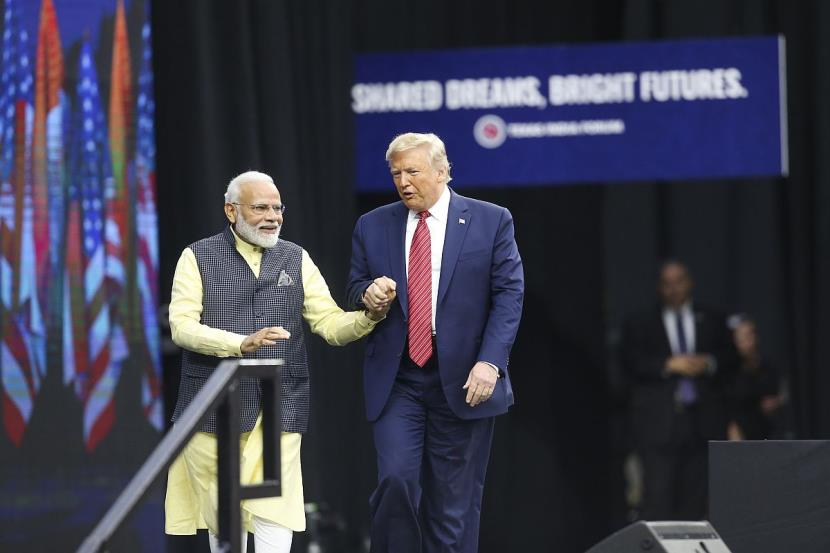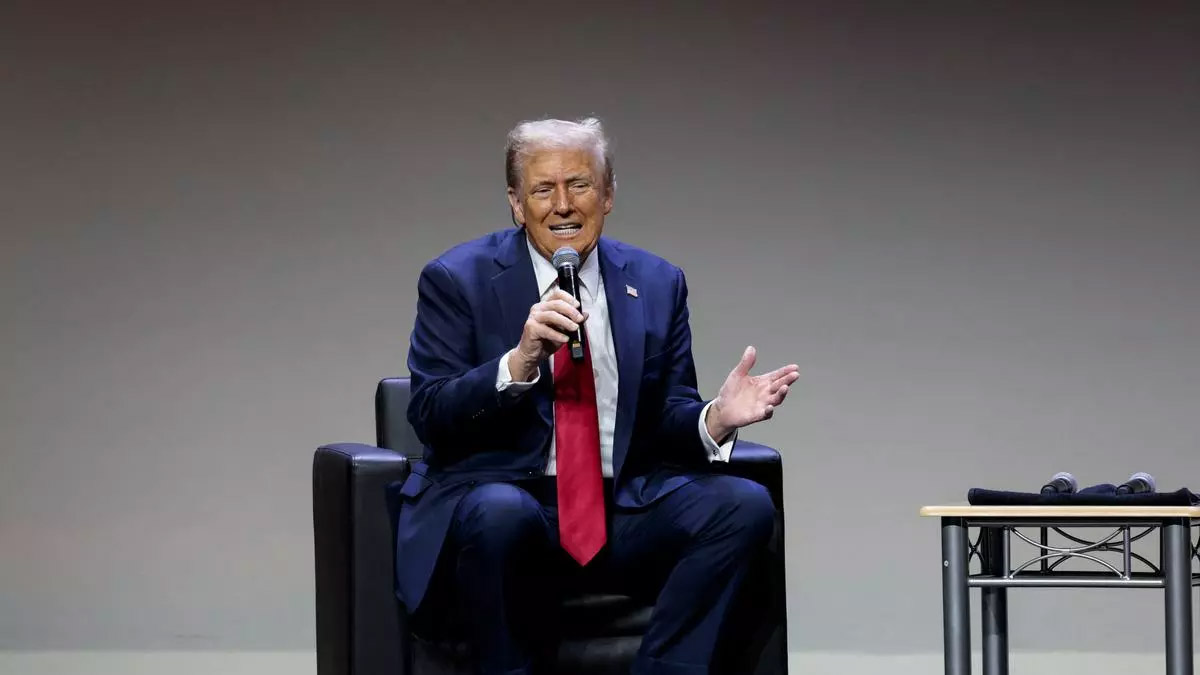In a recent economic policy speech delivered in Detroit, Donald Trump, the US presidential candidate, once again expressed his concerns over India’s “very high tariffs.”
While lauding his relationship with Prime Minister Narendra Modi and his leadership, Donald Trump asserted that India, despite its positive diplomatic relations with the US, is one of the world’s largest tariff-imposing nations.
His remarks come at a critical juncture as he plans to re-enter the political arena, outlining strategies aimed at economic growth, including reciprocal taxation, if elected to the White House.
Trump’s Criticism of India’s Tariffs: A Recurring Theme
Donald Trump has long maintained a stance against India’s tariff policies, which he views as disadvantageous to American businesses. During his presidency, this was a topic he revisited frequently.
In his latest speech, Donald Trump reiterated that India, while maintaining amicable relations with the United States, imposes some of the highest tariffs on American products.
Read : Gaza Can Be Better Than Monaco If Rebuilt Properly: Trump
Specifically, Trump pointed to Harley Davidson, a prominent American motorcycle manufacturer, as an example of a company that struggled to navigate India’s high tariffs, which were reportedly as high as 150 percent.
Read : Trump Challenges Biden to Golf Match with $1 Million Charity Bet
Trump’s recollection of his conversation with Harley Davidson’s representatives in 2019 further emphasizes his frustration. During his presidency, the issue had come to the forefront when Harley Davidson expressed concerns about expanding their business in India due to the exorbitant import duties.
Trump, then-president, directly addressed the matter by calling out India for its high tariffs. The issue of trade imbalances and tariffs was a significant point of contention between the US and India during his administration, and Trump’s recent speech indicates that it remains on his economic agenda.

India’s tariffs have often been the focal point of Donald Trump’s trade-related discussions. Despite expressing his admiration for Prime Minister Narendra Modi, Trump did not shy away from criticizing India’s tariff policies.
“We have a great relationship with India. I did. And especially the leader, Modi. He’s a great leader. Great man. Really is a great man,” Trump said. “But they probably charge as much … I mean, I think they probably charge more than, in many ways, China. But they do it with a smile. They do it… Sort of a nicer charge.”
Trump’s statement encapsulates his nuanced perspective on India: while recognizing its leadership and close ties with the US, he believes that India’s tariffs on American goods present a significant barrier to fair trade.
This friction has been a long-standing issue, and Trump’s rhetoric indicates that addressing these tariff disparities would be a priority if he were to regain office.
The Harley Davidson Case: A Symbol of Trade Frustrations
One of the key examples Trump highlighted in his criticism of India’s tariff structure was the experience of Harley Davidson. During his presidency, Trump met with representatives from the company, who expressed their difficulties in entering the Indian market.
The representatives reportedly informed Trump of the substantial tariffs India imposed on motorcycles, which could go as high as 150 percent. This high tariff barrier, according to Trump, significantly limited Harley Davidson’s ability to expand its sales in India, despite the country’s growing consumer base.
Harley Davidson had established a manufacturing plant in India to mitigate the tariff impact, hoping to sell more motorcycles in the region. While this move allowed the company to bypass some import duties, the challenges remained significant.
Trump, who had been vocal about promoting American manufacturing and trade fairness, took issue with the idea that American companies needed to build plants abroad to avoid high tariffs, even when they would prefer to export their products directly from the US.
“I said so do you sell many motorcycles because you think people want to buy a Harley? No, we sell very few in India, but they want us to go there. They said, if you go there and build your plant there, we’re not going to charge you anything,” Trump recalled in his speech.

For Trump, the Harley Davidson case exemplified what he saw as an unfair trade practice, where American companies were forced to adapt to foreign tariffs by relocating production instead of benefiting from free trade.
Despite his ongoing critiques, Trump maintained that his relationship with Modi and India was amicable. He praised Modi’s leadership and noted that India had made significant progress under Modi’s administration.
However, Trump’s stance on tariffs remained firm, underscoring his belief that countries like India should reduce their trade barriers and offer fairer terms to American businesses.
Trump’s Vision of Reciprocal Taxation and Its Implications
Trump’s criticism of India’s tariffs aligns with his broader vision for a more equitable global trade system. Throughout his time in office, Trump advocated for reciprocal taxation, a policy that would impose tariffs on countries that levy high taxes on American goods.
In his Detroit speech, Trump emphasized the importance of reciprocity in international trade, stating that the US does not impose tariffs to the same extent that other nations, such as China, Brazil, and India, do.
Trump described reciprocity as a critical element of his plan to bolster the American economy. “Perhaps the most important element of my plan to make America extraordinarily wealthy again is reciprocity,” Trump stated. “It’s a word that’s very important in my plan because we generally don’t charge tariffs.
I started that process, it was so great, with the vans and the small trucks, etc. We really don’t charge. China will charge us a 200 percent tariff. Brazil is a big charger. The biggest charger of all is India.”
This focus on reciprocal taxation reflects Trump’s broader economic philosophy, which prioritizes protecting American industries and workers from what he perceives as unfair foreign competition. By imposing tariffs that mirror those placed on American goods, Trump hopes to create a more balanced trade environment that benefits the US.
While the policy of reciprocal taxation may resonate with certain voters, particularly those in industries affected by foreign competition, it could also lead to trade tensions with countries like India, where tariffs on goods like motorcycles have already been a point of contention.

Trump’s promise to impose reciprocal taxes if elected to the Oval Office again signals that trade issues will be a central component of his economic platform. His focus on tariffs, particularly those imposed by India, highlights his commitment to reshaping America’s trade relationships and ensuring that US businesses are not disadvantaged in the global marketplace.
Donald Trump’s recent remarks on India’s tariffs highlight an ongoing issue in US-India trade relations. While the two nations maintain strong diplomatic ties, with Trump and Modi sharing a warm personal relationship, the question of tariffs has remained a point of friction.
India’s high tariffs, particularly on products like motorcycles, have been a source of frustration for American businesses, and Trump has consistently called for changes to these trade policies.
As Trump campaigns for a return to the White House, his focus on trade and tariffs remains a key component of his economic message. His proposal for reciprocal taxation reflects his broader goal of creating a fairer trade environment for American businesses.
While his criticism of India’s tariffs may raise concerns in some quarters, his continued praise for Modi’s leadership suggests that Trump sees potential for resolving these trade issues through diplomatic engagement.
Ultimately, the future of US-India trade relations will depend on the policies pursued by both nations. Trump’s emphasis on reciprocity indicates that if he were to regain office, the issue of tariffs would remain a priority.
How India responds to this challenge, and whether both countries can find common ground, will be critical in shaping the future of their economic partnership.

